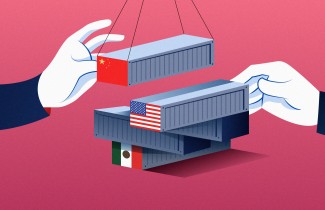Coronavirus Impact on the Mexican Economy
The government must start developing fiscal measures to compensate for the coming economic slowdown
The worldwide proliferation of coronavirus is wreaking havoc on our global economy, and Mexico is no exception. The main issue is found in China, where efforts to curb the spread of the virus caused a halt in its production processes. As a result, the rest of the world began to experience a drop in manufacturing exports to China and higher production costs due to a shortage of Chinese intermediate goods. Thus, leading international analysts have recently lowered growth expectations for China as well as for the rest of the world.
In Mexico, both global financial institutions and private analysts have already lowered growth expectations for this year. In fact, some analysts suggest that the national economy will not grow or may even decline as a result of the harsh coronavirus impact. Said impact stems from two sources, the first relating to the slowdown in U.S. industry due to the significant reduction in exports to China. A large part of the industrial processes in the U.S. is closely linked to Mexican manufacturing production, especially of intermediate goods. Throughout 2019, the export sector (manufacturing in particular) was the only one seeing growth and yet the economy dropped (-0.1% in the year). Please note that the U.S. economy grew at about 2% this year.
The second source is the reduction in imports of intermediate goods, which mainly come from Asian countries. Mexico is a country that imports a large part of the supplies used in the production of its exports. When there is a supply shock, it increases production costs and decreases productivity. Swiftly replacing suppliers with companies located in North America, for example, is not an easy task.
This scenario is already causing many countries to react with urgent measures to compensate for the economic slowdown. The first measure involves economic incentives where most of the world's central banks are lowering interest rates to encourage consumption and investment. The Central Bank of Mexico will likely follow this cycle and lower its target interest rate by up to 75 percentage points. On the other hand, many countries are also preparing fiscal measures to stimulate the economy. For instance, in the U.S., cheaper credits are being set up for SMEs as well as the elimination of payroll taxes. Also, global financial institutions such as the World Bank, among others, are developing rescue packages.
In Mexico, in addition to monetary policy, no fiscal measures have been advocated to encourage the economy. The problem lies in the fact that, in addition to the severe situation caused by the coronavirus outbreak, the recent drop in oil prices has put Pemex, the state-owned company, against the wall. And this is in a setting where public finances are strained by extremely weak tax collection. Due to the weak economy, both direct income tax (ISR) and indirect income (IVA) tax collection declined in 2019. In addition, part of the counter-cyclical savings fund left by the previous administration was used to pay for Pemex's debt. The state-owned company had a 92% increase in losses in 2019.
This year, the picture doesn't look good either. Reductions in growth expectations will lead to lower tax revenues. If we also consider the drop in crude oil prices, then Pemex will likely be affected as well. Although the federal government has hedge oil prices through a put option, it does not cover 100% of the export platform.
Thus, it is imperative to develop a fiscal reform to shield public finances. Although the Ministry of Finance (Secretaría de Hacienda y Crédito Público) had recently suggested it, this idea was dismissed by the President. Without a fiscal reform, there will be no resources left to meet the increases in public spending and will force the government to keep on cutting expenses or to use the remaining funds to compensate for the decline in revenues.
The government must immediately begin to develop fiscal measures to compensate for the coming economic slowdown.



